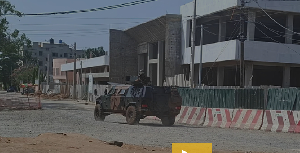While we wait, for positive response to the purgatory conditions, we will continue to accentuate the creeping deteriorating situations in the upper east, upper west, and the northern region. At the end of every farming season, our people harvest their crops that will last them, a couple of weeks,’ maximum few months. So they try to help themselves by cultivating tomatoes in the dry season.
The people in the aforementioned regions struggle to manually dig wells, to water their crops in the dry season, since most of the dams in these aforementioned regions are silted with fine-grained sediments and mud that even the living creatures and critters in the dams including such as fish and crocodiles are also struggling to survive in these dams, and are also feeling the neglect of our governments.
We still remember recently a farmer attempted to commit suicide because, he couldn’t sell his tomatoes. This is somebody who has pulled up his boot straps all by himself, to till the land by dint of hard work and perseverance. The procedure and stages to cultivate tomatoes demand physical and mental exertion; first he has to till the land, followed by nursery, planting, watering, applying fertilizer, and the continuous hands on nature of the (tomato) crop. All this emprise happens in a lengthy period, and then all of a sudden he sees the suppose buyers either buys with pittance or bypass to the next country to buy the same commodity.
Whatever the situation, suicide is not the answer to despondency however, pause for a moment to empathize with this man. Due to our upbringing, Ghanaians by nature are very sympathetic people. Most of us are from Christian, Muslim, and Traditional homes; we are our brother’s keeper, these are values imbibed in us from infancy. We encourage hard work and most of us are law abiding citizens. These are the putative nature of our people. Rewarding hard work encourages positive results but, to most people in these regions, dejection and indignation is the remuneration of hard work. A typical example is how this indignant man, who tried to kill himself. In the aforementioned part of this country, the vicious circle continues even if you follow the rules and do things right. Assuming this man was able to commit suicide; his family will be wallowing in pain, grief and uncertainty, the country would have lost a hard worker.
Initially, the makola women were buying from these tomato farmers. Then came a time when, greed surmounted their business drive for mutual benefit. Having worked with them for some time, the women realized the vulnerability of the farmers. So they devised inimical strategy to finagle the farmers. They show up in the morning collectively, to price the tomatoes cheaply and disappear to their hideouts. These farmers will sit in the market, waiting for the makola women till evening, because they can’t go home with those perishable goods. The women will then strut to the market in the evening and pay them pittance, knowing very well, the farmers have no choice but to take whatever is offered.
The level of exploitation of these women became incessant and ultimately one will describe their behavior as criminal, considering the modus operandi used to expropriate the wares from these farmers. It will surprise you to know that, these poor farmers pay taxes on every bowl of tomatoes at the gates of the market. Yet no one intervened to settle what was taking place. I have not seen or heard of a government official, who cares to intervene between these women and the farmers in these regions to facilitate amicable solution to their problems.
Of late, the makola women have even shifted their business to Burkina Faso, neglecting the tomatoes produced in these regions. Wadiya is a village in Burkina Faso, and during tomato season, all the makola women who trade in tomatoes come from Accra, they cross all the three regions, upper east region, upper west region and the northern region, cross the Paga border into Burkina Faso, Wadiya to buy tomatoes. They neglect what is produced in Ghana and proceed to Burkina Faso to buy the same commodity.
If the tomatoes cultivated in these regions are not suitable for the Makola women, why not get the necessary seedlings for the famers in these regions? In this dire situation, I can’t believe that our borders are open for these women to cross to the next country to assist their famers than ours, but that is exactly what is happening at the Paga border. I have not seen or heard of a government official, who cares to intervene between these women and the farmers to facilitate amicable solution to this problem.
If you happen to see the faces of dejected people who have toiled to get their produce (tomatoes) thinking they might get something out of their emprise, only to see the buyers going somewhere to buy the same commodity. Will somebody empathize with our people? It seems the politicians we send to the Accra do not arrantly elucidate the dire situation our people find themselves.
a) Now we want to know what happened to the Bolgatanga/Kolugu Tomato Factory. b) Has the government devised any plan to retool that factory? c) Do we have plans to get expellers to process the shea-nuts into shea butter for export?
We have a lot of shea-nuts in these regions, and most cosmetic companies’ use these products for crèmes in most advance countries. Government should pragmatically consider doing something about the shea-butter. At this moment, expressivity of our grievances has become very crucial; we the people will no longer keep quiet again while our people suffer unnecessarily. Together we have to lay bare the challenges facing our people for assistance. We will shout until somebody listens and rescue us from this blistering pathetic situation.
All that I’m accentuating in my articles are not stochastic gestures, these are real palpable situations, I have seen up close and they are painful. Witnessing such purgatory situation without any remedial action is troubling. We should not wait till somebody finally kills himself before something is done. Government should please, summarily do something to facilitate the sale of these produce (tomatoes) between the Makola women and the farmers. With proper mediation, it will smoothen rough edges of the iniquitous relationship that exist between them. This will equally pave way for sustainable business atmosphere for their mutual benefit.
Balemwo Assam
Washington DC balemwo@yahoo.co.uk
Opinions of Sunday, 22 November 2009
Columnist: Assam, Balemwo














